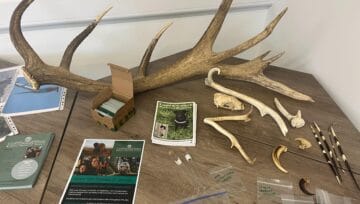Capel Manor College Welcomes Four Baby Beavers at Enfield!
Capel Manor College is thrilled to announce the arrival of four new baby beavers, also known as kits, at our Enfield campus! These new additions bring the Enfield beaver family to a total of seven healthy members, marking a significant milestone in London’s first beaver release project.
This project, which promotes biodiversity and aids in flood alleviation, is a collaborative effort between Enfield Council and Capel Manor College.
A Historic Milestone in Conservation
The beaver release project, launched in 2022, represents the first reintroduction of beavers to London in over 400 years, after they were hunted to extinction in the 16th century. This groundbreaking initiative was made possible through the partnership between Enfield Council and Capel Manor College, London’s only environmental college. The project aims to restore natural habitats and contribute to local flood management efforts.
The beavers are thriving in a specially designed six-hectare enclosure near the Forty Hall Estate. This space, carefully crafted by Enfield Council and project partners, has created an ideal environment for the beavers to live and reproduce. The successful birth of these kits is a testament to the project’s success and its positive impact on the local ecosystem.
A Collaborative Success
Cllr Chinelo Anyanwu, Enfield Council’s Cabinet Member for Environment, Culture and Public Spaces, shared her excitement about the new arrivals:
“We are delighted with the birth of these baby beavers. This project is a significant step towards enhancing our local biodiversity and improving natural flood defences. The success of Enfield Council’s beaver project serves as an inspiring model for future conservation efforts in urban areas. The beavers are already making a positive impact on the ecosystem, and we look forward to seeing continued benefits for the community and the environment.”
Capel Manor College has played a crucial role in supporting and monitoring the beavers. Meg Wilson, Animal Collection Manager at Capel Manor College, emphasized the educational value of the project:
“The arrival of the kits highlights the success of our collaboration and the dedication of our staff and students. Monitoring and documenting the positive impact of the beavers is providing invaluable hands-on learning opportunities and underscores the critical role of biodiversity and natural habitat restoration. We look forward to witnessing the growth of the kits and their future contribution to the transformation of the local ecosystem.”
A Broader Vision for Environmental Stewardship
This beaver release is part of Enfield Council’s wider Natural Flood Management initiative, which aims to protect homes and restore local river habitats. By creating a natural wetland ecosystem, the beavers are playing a key role in flood defence and biodiversity enhancement. This initiative aligns with Enfield Council’s Climate Action Plan and Blue and Green Strategy, underscoring the importance of sustainable environmental practices.
In a further boost to the project, Enfield Council and Capel Manor College secured £50,000 from the Rewild London Fund earlier this year. This funding, provided by the London Wildlife Trust in partnership with the Mayor of London, will be used to expand the beaver enclosure, allowing the colony to continue to thrive and make a lasting impact on the local environment.
A huge thank you to everyone who has worked with us on this project, including all the staff here at Capel Manor College, Enfield Council, Beaver Trust (including Dr. Roisin Campbell-Palmer), Urban Farming and Conservation (Dr. Angelika Von Heimendahl), and Derek Gow Consultancy. Your dedication and expertise have been invaluable to the success of this initiative.
Did You Know?
- A baby beaver is known as a kit!
- A group of beavers is called a colony or sometimes a family—how fitting!
- These are the first beavers to live in London for over 400 years!
- The Eurasian beaver was hunted to extinction in Great Britain in the 16th Century, but recent studies have shown their return could bring several benefits.
- Beaver dams slow the flow of water through a river catchment and can reduce the impact of flooding on homes downstream. The sponge-like wetland habitats they create enable other forms of wildlife to flourish.
- The two parent beavers were introduced in December 2022, birthed their first kit in 2023, and this litter now brings the beaver family to a total of seven.




